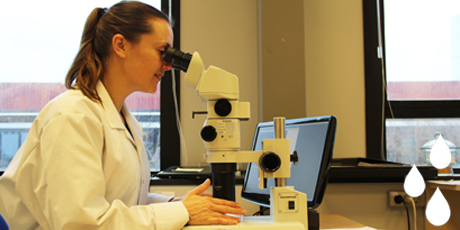'The basic research in the understanding of structure-function relationship of metalloproteins might be highly relevant for the discovering of new drugs that might change the life for patients suffering from serious diseases – the basic research focus not associated with any specific diseases is critical to perform academic breakthrough discoveries'. Kim Andersen, Vice President at Lundbeck A/S
MIND is an interdisciplinary basic research network established to understand how metalloproteins function. The main aim of the network is to provide a collaborative platform for investigating the structure-function relationship of metalloproteins involved in neurological disorders, with the long-term goal of understanding how these protein properties cause disorders and how they can be remedied.
The five members - Associate Professors Hans E. M. Christensen, Pernille Harris, Kasper P. Kepp, Günther H. Peters and Kenny Ståhl - of the reserach network wish to collaborate and share their findings and enable the pharmaceutical industry to come up with treatments for these disorders – that put such severe and personal strains on afflicted individuals and their families.
The network was newly formed in 2013 by the five scientists at the Department of Chemistry. The team has collaborated individually in the past – and decided to pool their collective and complementary competences and experience into one focused research network capable of analysing and understanding this complex area through in-depth basic research. The five strongly believe in the strengths and advantages of bringing together and utilising different disciplines – to shed new light on the problem from all angles and combine the collective skills and knowledge to come up with enhanced and better solutions. Between them, they can design and produce proteins (Hans E.M. Christensen), measure and analyse proteins using crystallography and spectroscopy (Kenny Ståhl and Pernille Harris), and perform in-silico modelling of proteins (Günther Peters and Kasper P. Kepp). Thus, they hold the building blocks of expertise to put together the pieces in the puzzle of understanding metalloproteins – and fill the gaps in our knowledge.
 The ultimate driver
The ultimate driver
The ultimate driver is to help alleviate a growing problem of immense human cost. The team puts its fundamental research of metalloproteins into a wider perspective. “We wish to provide fundamental research knowledge that can help the pharmaceutical industry unveil the causes of neurological disorders and eventually alleviate these. The costs of these disorders are huge – not just in terms of cost to society – the neurological diseases put a tremendous strain on the families, both personally, health wise and financially! And the problem is a growing one, in Denmark as well as globally,” explain the five scientists.
Thus, neurological disorders, like e.g. Alzheimer’s and Parkinson’s are diseases that attack a growing number of people – and in particular, as more and more people reach high age. In Denmark, 87,000 people suffer from dementia – and of these, more than 50% suffer from Alzheimer’s disease. Only 2-3% of these cases are estimated to be genetically linked – and for the remaining part, the causes are not clear.
Classic causality dilemma
However, it is generally accepted that metals play a role in the neurological diseases. Increased or decreased levels of metals can be observed in relation to these diseases – and in particular, copper and zinc are in focus. The question, however, is whether the imbalance in the metals trigger the diseases or whether the diseases cause this imbalance. “This is the classic what came first question. The chicken or the egg?” the team wonders.
Unveiling the properties of metalloproteins and understanding how they work will combine both experimental and theoretical aspects and various research disciplines. To this end, the established network will provide an excellent platform for national and international collaboration. Furthermore, the network provides an excellent educational environment for students since they are exposed to an interdisciplinary research approach – which is precisely the environment they will find in the pharmaceutical industry.
The current members of the network are Associate Professors Hans E. M. Christensen, Kenny Ståhl, Pernille Harris, Günther H. Peters, and Kasper P. Kepp.
The main aim of the network is to provide a collaborative platform for investigating the structure-function relationship of metalloproteins involved in neurological diseases, with the long-term goal of understanding how these protein properties cause diseases and how they can be remedied.